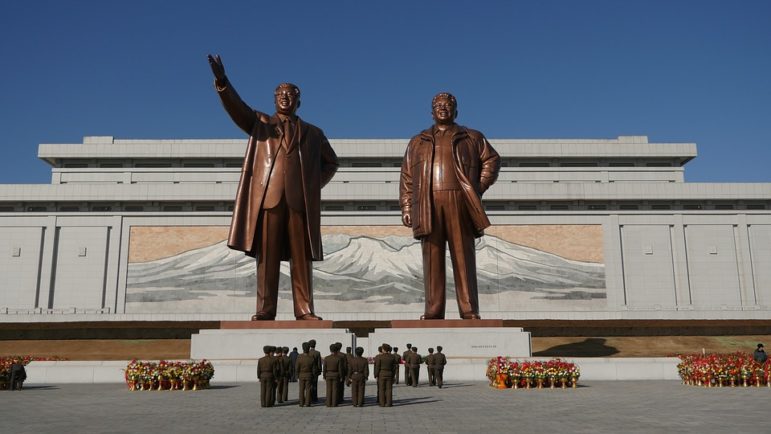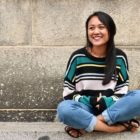
Passing on the Power: Bronze statues of Kim Jong-un’s grandfather, Kim Il-sung, left, and his father, Kim Jong-il, at Munsu Hill in Pyongyang. Credit: Pixabay
Choi Seon-Young worked as a journalist in North Korea for seven years before defecting to South Korea in 1996. As an investigative reporter in South Korea, Seon-Young discovered Kim Jong-un would supercede Kim Jong-il as supreme leader of North Korea two years before even the South Korean government and intelligence agencies knew.
“I lived in North Korea for 30 years and was educated there, but filtering through misinformation is difficult,” Seon-Young said.
Despite her experiences covering North Korea, from both inside and outside its borders, Seon-Young still has a hard time understanding it.
Seon-Young, now a reporter for South Korea’s Yonhap News Agency, addressed a room full of journalists at the Uncovering Asia conference in Seoul: “You may think I’m an expert on North Korea, but I’m not. Information related to top leadership is challenging to obtain and when I came to South Korea, I realized some of the information I had was not even true.”
Seon-Young joined a panel of experts, including Korea-based independent researcher Martin Weiser and managing editor of 38 North Jenny Town, to share lessons learned and practical tips on how to better investigate North Korea.
1. Build a network of reliable sources.
Journalists often operate on tight deadlines, so it’s important to build a network of reliable sources so when you start reporting you know who to call right away.
“Identify expert sources that have actually seen primary documents or talked to people in North Korea,” Town said.
2. Expertise in one area doesn’t translate to every situation.
When reaching out to experts for context or comment, keep in mind that experts on more general or related topics might not be experts on every situation at hand.
For example, Town said she noticed experts on the non-proliferation of nuclear weapons would be quoted in news articles, making blanket statements about North Korea without the contextual knowledge needed to understand the complexities of that diplomatic process.
“We see this a lot in American press,” Town said. “You’ll have experts on China, Japan or security issues give expertise through their own lens. People give them too much credence on their North Korea statements. There are very few people who are true experts on North Korea.”
3. Question the veracity of human sources.
Ask sources how they know what they say.
When it comes to defectors, Town said, they might offer answers but that doesn’t mean they had access to that information when they were in North Korea. And if you have sources from within North Korea, question why the source is sharing information with you and evaluate whether the information is representative.
Always find information from other sources to corroborate your sources, Town emphasized.
“We have to be able to distinguish false information and facts in order to build trust,” Seon-Young said. “We shouldn’t be obsessive about reporting scoops.”
4. Primary documents are really important.
Read as much as you can on what you’re covering. There are plenty of documents available, Weiser said. There are archived leadership texts, media reports, institutions and official documents, such as visas and passports.
One trick, Weiser said, is to look for contradictions and patterns across these texts. He’s found contradictions within state-sanctioned texts that led to further investigation. He’s also found very misleading translations when reading news reports.
Weiser also talked about how he’s compared dates and ID numbers on passports to figure out how many passports were issued in a certain period of time. He also showed that looking at the ID numbers found on visas, you can glean tourism patterns.
“Primary sources are really important. Too much reporting relies on reporting of reporting,” Town said. “You lose accuracy over time if you start playing media telephone.”
5. Pay attention to methodology.
When citing a study or report, always question the methodology. Ask how samples were chosen, if findings can be considered representative, criteria of analyses, where the research took place, etc.
“North Korea is a popular topic right now,” Town said. She’s noticed more think tanks and academic researchers focusing on the country. Some are more responsible than others.
Essentially, when it comes to investigating North Korea, Seon-Young reminded the audience that all diligent journalistic practices still apply. Question everything. Corroborate everything.
“North Korea is one of those countries where it’s difficult to get information, so people don’t really try,” Town said. “Information is knowable, but you really have to try. Not enough people believe that.”
 Mariel Padilla is a data and investigative fellow at Columbia University’s Graduate School of Journalism. Her work has been published in USA Today, Patch.com, FilAm Magazine, The Philippine Daily Inquirer and The Cincinnati Enquirer, where she contributed to the Pulitzer-prize winning project: “Seven Days of Heroin.”
Mariel Padilla is a data and investigative fellow at Columbia University’s Graduate School of Journalism. Her work has been published in USA Today, Patch.com, FilAm Magazine, The Philippine Daily Inquirer and The Cincinnati Enquirer, where she contributed to the Pulitzer-prize winning project: “Seven Days of Heroin.”
